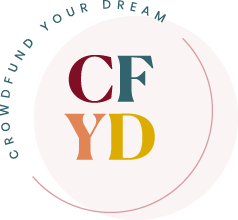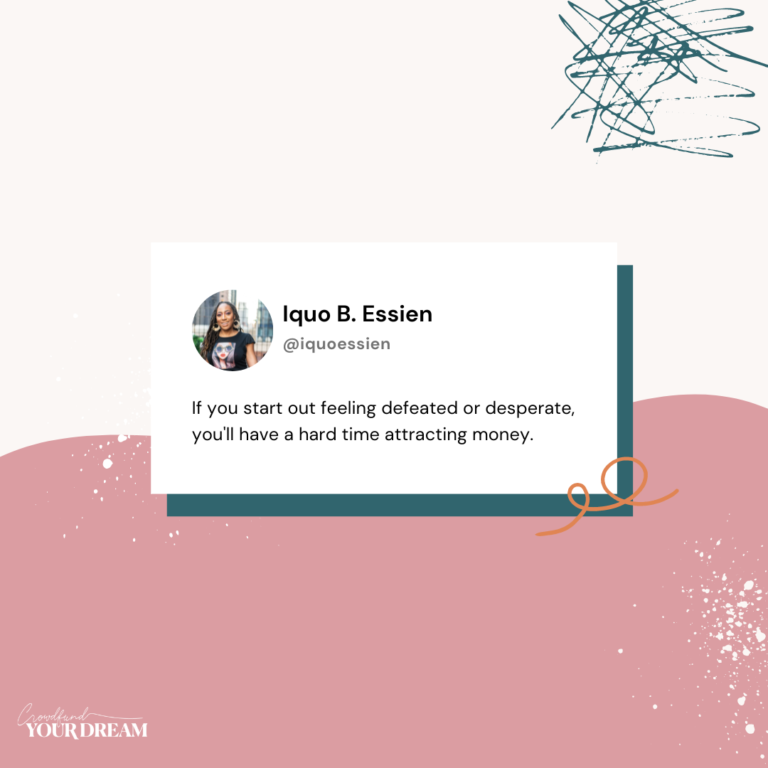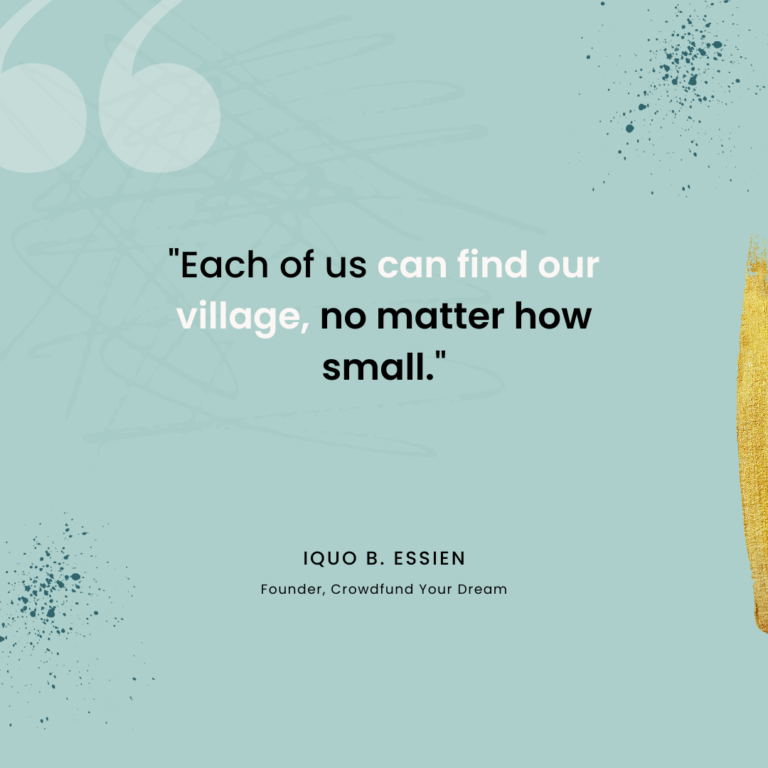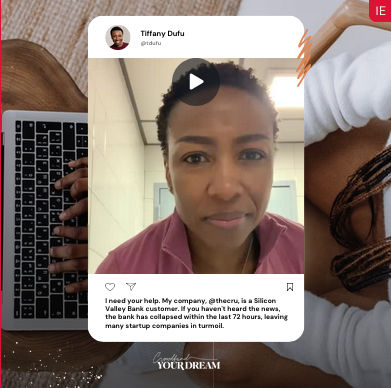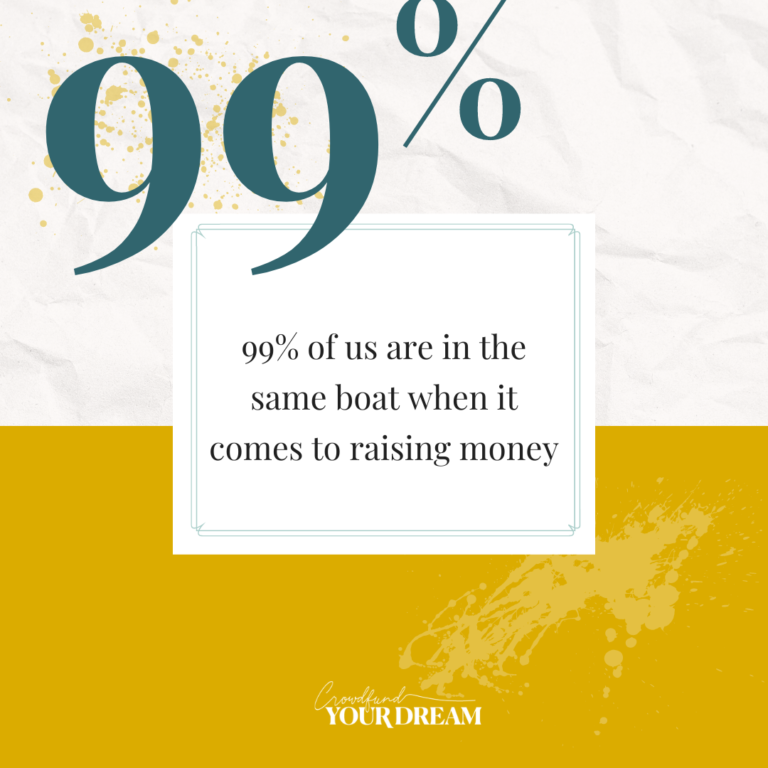Whether it’s a crowdfunding campaign or an equity raise, every business owner wants to maximize the ROI for their business, both the time and effort involved in raising money as well as the cost of running a successful campaign. But how do you maximize the return on your investment in a fundraising campaign?
To answer this question, let’s take a look at the average cost of running a successful $100,000 campaign for a product launch on Kickstarter.
$100K Campaign ROI
Brands launch products on Kickstarter because of the allure of their massive community of potential backers. But in order to be discovered, the platform’s algorithm must decide that your campaign has a high likelihood of succeeding. You prove that by raising 20-30% of your goal on the first day of your Kickstarter campaign.
Knowing you need 20% of your total goal of $100K on the first day, you need to build up a mailing list that will convert $20K within hours of launching in order for Kickstarter’s algorithm to pick it up and show it to their community.
Let’s say that $20K equals 280 units of your product sold at $70 each. And based on market averages, you will need to build an email list of 11,200+ people, assuming a 2.5% average conversion rate to support that goal.
For our purposes, let’s say you’ve got the support of an agency advising on your campaign.
Let’s take a look at a summary of your expenses on a successful $100K Campaign to calculate the ROI for this business:
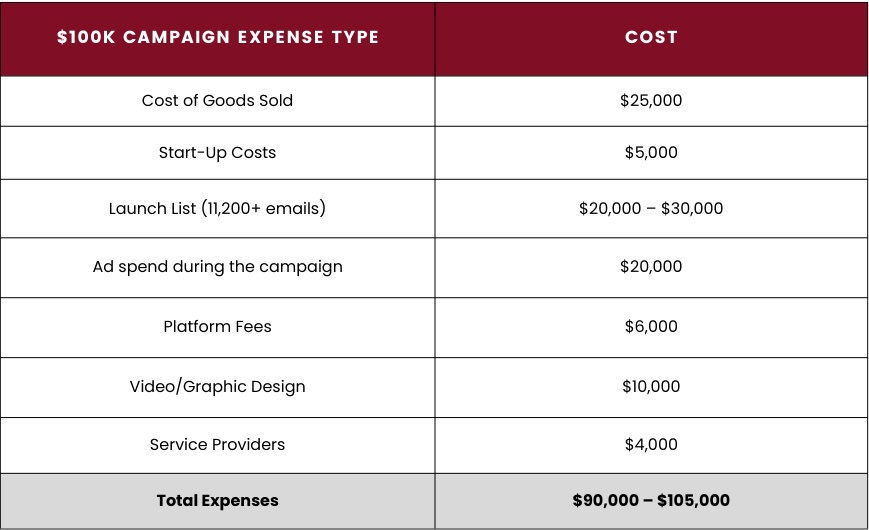
$100,000 Fundraising Total
– $90K-105K Total Expenses
= (-$5K)-10K Profit
That’s right, a successful $100K raise put this founder $5K in the hole.
As you can see, you’re fairly lucky if you can break even on a $100K product campaign such as this. So why do people do it? In short, because well-funded startups and existing brands are down to pay for press and buzz around a launch, even though it makes very little financial sense. Their goal is to use the crowdfunding platform as a business launchpad, with their success providing market validation while raising brand awareness, converting leads into customers, providing access to low-risk capital, and creating a pipeline to potential investors.
Crowdfunding has been a gamechanger for startups, largely social businesses united by the prospect of using business to create social change. And for the most part, far from the well-oiled machines that high stakes campaigns have become, most small businesses by and large mount campaigns with a dollar and a dream.
$35K Campaign ROI
For an example of what a 5-figure campaign budget looks like, let’s take a look at my recent successful $35K campaign to calculate the ROI for my business:
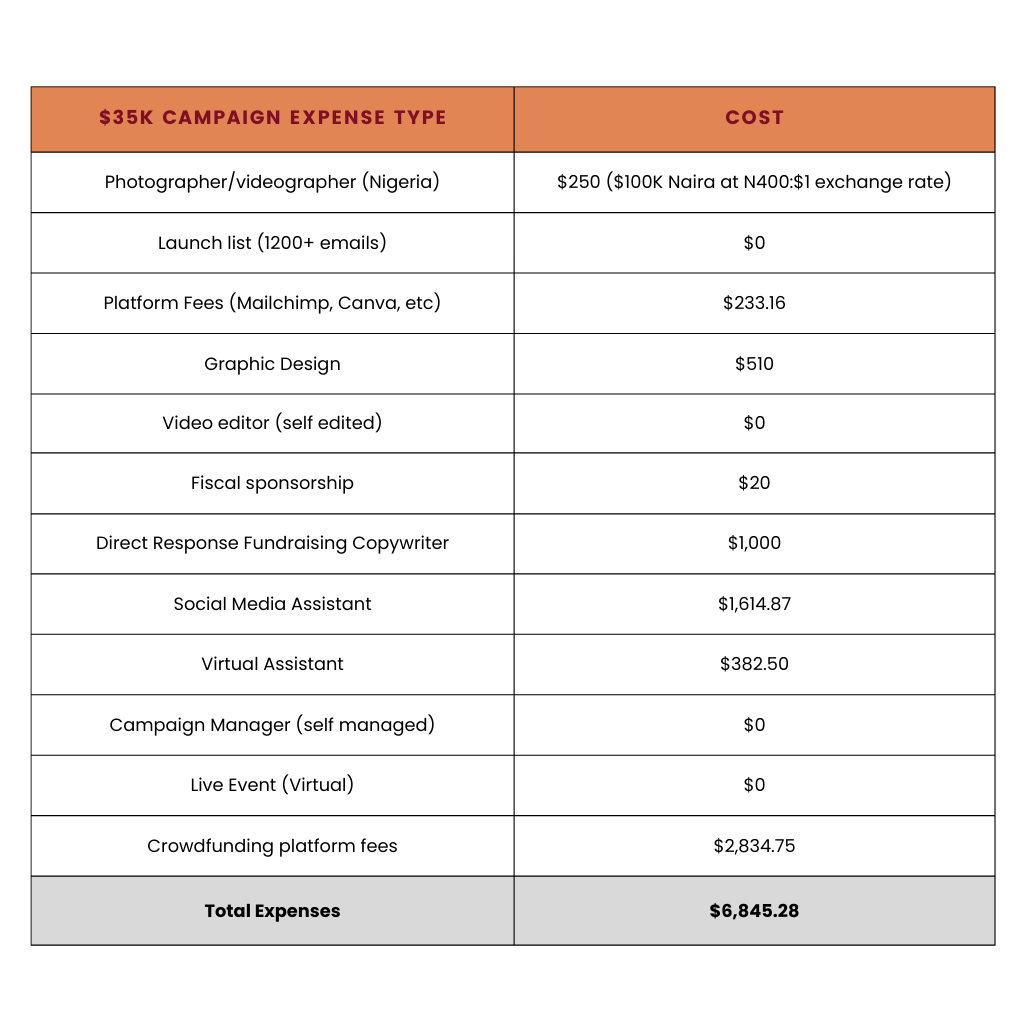
Fundraising Total: $35K
– Total Expenses: $6.8K
– Land Purchase Price: $30K
= Profit: -$1.8K
That’s right, my successful $35K raise put me almost $2K in the hole—although I do now own a piece of property that will accrue value over time.
Because I had a pre-existing mailing list, I spent nothing on ads and focused my energies on reaching out to everyone I know. Now, in my case, because I’m a professional fundraiser and filmmaker, I was able to successfully manage my campaign myself as well as shoot and edit my pitch video.
But you can imagine how my total expenses would’ve increased if I didn’t have those skills and had to hire help. Also, if my live event was in-person (eg, a fundraising gala) as opposed to virtual (eg, a Zoom event) and sponsored by a partner organization, those costs would add a significant bump to my expenses.
To execute your campaign and deliver your brand promise, you must factor in all these expenses—just like you would the cost of creating a business plan, registering your business, building a website, purchasing equipment, and paying for advertising to make sales. But most people running their first fundraiser don’t factor in these costs of executing their campaign. They often don’t know:
- What collateral and activities comprise a successful campaign (eg, pitch video, ads, network mapping, outreach, launch list)
- What types of expenses they should plan for
- How much each expense adds to their budget
- How much their expenses affect their profits
- How important a successful fundraiser is to their bottom line and the overall success of their project / business launch (or growth, in the event you’re raising funds to build capacity for an existing business)
As straightforward as it sounds to read, many people don’t figure out any of these things beforehand. They don’t do any research, nor do they study successful campaigns before they launch. Most also incorrectly assume that it costs nothing to launch a fundraising campaign, and that cash only flows in the positive direction. Due to the prevalence of viral campaigns in pop culture, they think that successful fundraisers primarily rely on luck and the kindness of strangers.
Truth is: even if you don’t have a large campaign budget, most successful fundraisers are planned.
If you can craft a compelling story, package it up, and share it with a call to action (ie, give), you can turn any crowd into an engine powering your dream. And for creative projects, films, businesses with low overhead, and existing brands with a highly-engaged existing community, crowdfunding can still be quite effective even in the absence of a large campaign budget.
But folks who want to be successful need to do their research and learn fundraising best practices. They need to budget accordingly to execute the campaign as well as deliver on their brand promise, because anything less means they can’t launch their business, or have to launch on a shoestring budget with subpar service, staffing, materials, or behind schedule. And often they need to hire service professionals to ensure a successful raise.
But why do I need to hire a professional? You might ask.
Let’s take me, for example. If I wasn’t a professional fundraiser, didn’t know how to raise money, and wasn’t sure that I could do it on my own, I would have hired a campaign manager in addition to my social media assistant, virtual assistant, and fundraising copywriter. (Believe me, without a small but mighty team of assistants, I never would’ve succeeded at the raise!) Let’s say the manager costs $5,000. It might sound expensive on the front end, but it makes all the difference on the back end.
$10K (Unsuccessful) Campaign ROI
To calculate the ROI for your business when hiring a fundraising consultant, let’s consider what would have happened, in this scenario, if I didn’t know how to raise money, refused to hire help, crossed my fingers, and raised $10,000 total:
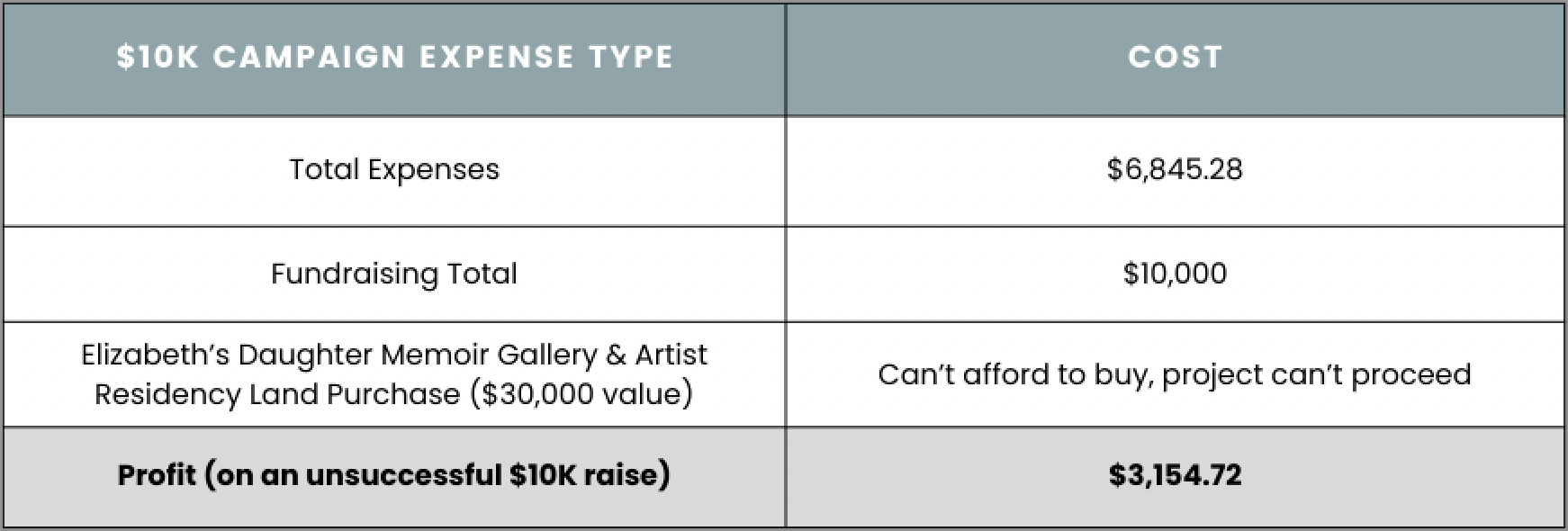
Had this scenario happened, I would’ve been faced with launching a second fundraiser, or having to return my backers’ money when I couldn’t afford to buy the property. Game over.
I can’t tell you how many times I’ve seen this happen to folks who don’t hire help—whether from me or another consultant—and try to run their campaigns on their own. Without fundraising skills and experience, they struggle to set up, launch, and succeed at their campaigns. Nine times out of ten, they fail to reach their goal, and don’t launch or grow their business. They often decide that “fundraising doesn’t work,” and give up on their dream altogether, or try to make do with less.
Conclusion
My goal is to help founders launch fully funded dreams.
If you’re not planning a fundraiser the same way you plan a business launch, you’re not planning for success. Especially if you’re trying to raise up to $500K. You simply can’t launch that type of campaign on a dollar and a dream.
Successful fundraisers are planned—typically with a robust crowdfunding campaign (ie, equity or rewards-based), or a strong pitch deck, networking, ground game, and relationship building. Knowing the costs associated with your campaign, planning for them, and building them in to your planning, is half the battle.
Need a fundraising ROI calculator? Check mine out and start crunching those numbers! Change the expenses to reflect your real costs, whether you’re hiring a copywriter, or graphic designer to create a pitch deck, or taking a fundraising course (like mine!).
And remember: if you’re not planning for success, you’re planning to fail! 💰
Hi, my name is Iquo! I’m a writer, director, and entrepreneur who helps women and BIPOC founders raise up to $500K to fund their businesses—without grants or venture capital—by leaning into their founder stories, their culture factor, and the communities their businesses serve. I serve my clients primarily through my online course and consultancy, Crowdfund Your Dream. Fill out a client application to discuss your fundraising strategy or follow me on LinkedIn for more storytelling, marketing and fundraising tips for diverse founders.



